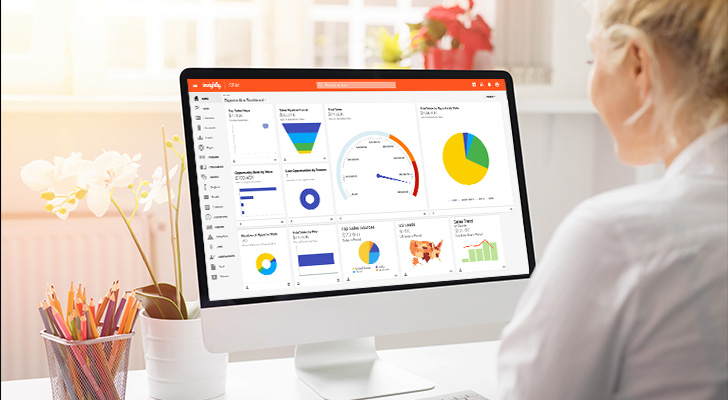Your team should love the tools they’re using.
Odds are, they probably don’t love them all.
Now more than ever, it’s essential that your CRM has the ability to integrate with the tools your teams already use. Easier integrations make it easier to adopt across teams, helping your business better achieve its goals.
If you’re new here or just need a refresher, CRM, or Customer Relationship Management, is a software system that helps businesses manage interactions with customers and prospects. With a CRM solution in place, you can collect and store customer data, identify trends, and streamline communication. CRM is an essential tool for businesses of all sizes and across industries.
Some features of a CRM include contact management, sales management, workflow automation, and access to analytics and reporting dashboards.
- Contact Management: A CRM enables businesses to store contact information, previous communication with contacts, and customer data in one place. Contact Management makes accessing customer information and tracking communication history easy while managing current and prospective customer relationships effectively.
- Sales Management: Track the entire sales pipeline in your CRM and have better insight into your sales process from lead generation to conversion. Sales management features enable businesses to identify potential leads, track their progress through the sales funnel, and close deals more efficiently.
- Workflow Automation: Utilize your CRM system to automate repetitive tasks like following up from a form fill or syncing a calendar. Saving time and streamlining tedious processes enables your team to focus their efforts on selling.
- Analytics and Reporting: Get valuable business insights into customer behavior, sales trends, and other metrics within your CRM. Make more data-driven decisions, improve customer engagement, and optimize your marketing, sales, or customer service strategies with key data points.
We get it; you’re busy managing leads, nurturing prospects, and supporting current customers. Throw in managing invoices and sorting through customer transactions — it can be overwhelming. Luckily, that’s where QuickBooks can help.
Key takeaways
- Integrating your CRM with QuickBooks connects customer interactions to financial data, creating invoices automatically and giving your team the full picture without jumping between systems or doing manual data entry.
- You can’t use QuickBooks as a CRM since it’s built for accounting, but several CRMs connect directly through native integrations that work better than third-party workarounds that often break.
- Direct integrations like Insightly sync customer data both ways, let you create QuickBooks customers from CRM contacts, and show invoice history right in your customer records for better sales conversations.
- Options include Insightly for unified sales and finance workflows, HubSpot for marketing-focused teams already in their ecosystem, Zoho for businesses using multiple Zoho apps, and Freshsales for basic invoice visibility in customer records.
Integrating Quickbooks with your CRM
QuickBooks is the industry-standard accounting software for small and medium-sized businesses. It’s built to manage income and expenses while giving you a complete view of your business finances. Thousands of Insightly users count on QuickBooks to send invoices, create budgets, prepare taxes, and more. The software is flexible and scalable with affordable pricing.
Integrating your CRM with QuickBooks can give you a complete picture of your customer data. This integration enables businesses to manage customer data, track sales, and automate invoicing and payment tracking processes. Choosing a CRM for QuickBooks integration can be especially beneficial for users who want to make their sales and accounting processes more efficient. A full view of your customer’s interactions and financial transactions in one place can help you make more informed decisions, provide better customer service, and even increase sales.
Should you integrate your account and CRM software?
Integrating accounting software and CRM software can benefit your business in several ways. Linking these two systems can simplify financial processes, improve overall customer management, save time and money, and reduce errors from manual inputs across multiple systems.
As mentioned earlier, one benefit of choosing an accounting software integration for your CRM is the ability to track customer transactions and interactions. At their core, CRM systems are designed to store customer data, which includes contact information and purchase history.
When integrated with accounting software, you can automatically create invoices and record payments in the accounting system based on your CRM data. That’s right; in this case, integrating also means automating. Say goodbye to manual inputs across different software systems.
Another reason to integrate the two systems is to improve financial reporting. More accurate reports can be generated by combining financial data with customer information, leading to a better understanding of customer behavior and how that behavior impacts financial performance.
Integrating accounting software and CRM can give your business a more holistic view of your financial and customer data, helping you make more data-driven decisions and improve your bottom line.
Can you use Quickbooks as a CRM?
A common question among many small and medium-sized businesses: Can you use Quickbooks as a CRM? The short answer, unfortunately, is no.
Quickbooks is a popular accounting software with many robust features that help manage finances, but Quickbooks is not designed to be a CRM. While Quickbooks does have some basic customer management features, such as contact management and sales tracking, Quickbooks cannot be used as a proper CRM.
However, if you’re a QuickBooks Online user and need a CRM or vice versa, there are ways to connect the two. You can link the two systems using a third-party CRM software that integrates with QuickBooks or a CRM software specifically designed for QuickBooks integration
QuickBooks can be integrated with a CRM system to provide businesses with a comprehensive financial and customer relationship management solution. With the ability to sync customer data and have payment details available at your fingertips, you can better track sales and marketing efforts to gain valuable, customer-centric financial insights into your customers’ buying habits and preferences.
Integrating QuickBooks with CRM software like Insightly can provide your business with improved customer relationships and a deeper understanding of your customer.
How to set up a QuickBooks CRM integration
Now that you know the why, it’s time to break down the how. When thinking about QuickBooks CRM integrations, it’s important to note there are two main types of integrations available, native and third-party integrations.
Native or direct Quickbooks CRM integrations
Native or direct integrations are built into QuickBooks, allowing users to connect their CRM system directly to QuickBooks.
Developed and tested by QuickBooks, native integrations are pretty straightforward. QuickBooks Online offers native integrations with Microsoft 365, Google Workspace, and Insightly CRM. QuickBooks Desktop has native integrations with Microsoft Outlook, Excel, Word, and more.
Third-party Quickbooks CRM integrations
Third-party integrations offer more advanced features, customization options, and integrations with other applications.
These integrations allow businesses to connect their CRM system with other business tools, such as inventory management, project management, and marketing automation software. Most QuickBooks CRM connections are through third-party integrations.
Which CRMs have a direct integration with QuickBooks?
Some CRMs like Insightly connect directly to QuickBooks without needing third-party tools. Plenty of others require you to set up connectors or workarounds using third-party automation tools like Zapier (which often just creates more things to break).
Here are a few CRM options with direct integrations via the QuickBooks App Store, and a TL;DR version of what you get with each:
- Insightly — Works with QuickBooks Online. You can create invoices automatically, sync customer data, and see sales activity plus financial history in one place.
- HubSpot — Connects with QuickBooks Online to sync invoices, payments, and outstanding balances. Good fit if you’re already using HubSpot for marketing and sales.
- Zoho CRM — Integrates with QuickBooks Online to handle invoices and customer records. Works best if you’re using other Zoho apps.
- Freshsales — Links QuickBooks Online invoices directly to customer records in the CRM. Straightforward setup with basic invoice visibility.
The 4 best CRMs for QuickBooks (and what you get with each)
Integrating QuickBooks with a CRM can make a huge difference for your business. But not all CRMs are built the same.
Some play nice with QuickBooks right out of the box. Others require workarounds that’ll make you question your life choices. Here’s what actually works.
1. Insightly
Insightly’s CRM platform connects directly with QuickBooks Online. The goal is simple: give your sales and finance teams one place to see everything.
Customer data, pipeline info, and financial transactions all show up together. No more jumping between systems to figure out if someone’s a good customer or a payment nightmare.
What you get with Insightly
- QuickBooks data shows up directly in your CRM records—no more tab-switching to get the full story
- Copy and link records between systems without duplicate entry (because who has time for that?)
- Create QuickBooks customers from Insightly contacts in one click
- See the whole customer journey by connecting invoices and payments to opportunities and projects
- Quick setup through Intuit’s marketplace (that actually works like it’s supposed to)
Insightly works best if you’re a growing business that needs sales, marketing, and finance working from the same playbook, but may not be ideal if you’re a solo operator just getting started.
How one company uses their QuickBooks integration
EnterpriseIS picked Insightly specifically because of the QuickBooks connection. They manage customer interactions and automate workflows through Insightly, then everything flows into their financial system automatically.
The integration cut their manual data entry time and eliminated the errors that come with copying info between systems. Plus, they can now match customer interactions to financial transactions — which helps them spot opportunities to improve service and increase sales.
2. HubSpot
HubSpot’s integration with QuickBooks Online connects your marketing and sales activity to actual revenue data. Deals convert to invoices, payments flow back automatically.
Works well if you’re already using HubSpot for your go-to-market strategy and want finance included in that ecosystem.
What you get with HubSpot
- Bidirectional sync for contacts, products, and invoices
- Convert quotes and deals into QuickBooks invoices from within the CRM
- Configurable sync settings with error alerts to catch issues before they become problems
- Reporting dashboards that show revenue insights alongside pipeline tracking
HubSpot makes sense if you want to extend your existing marketing and sales workflows into billing, but may not be ideal if you need deep financial automation or have complex tax requirements in non-U.S. regions.
3. Zoho CRM
Zoho CRM connects with QuickBooks Online through their marketplace and automation builder. Sales orders in Zoho become QuickBooks invoices, and updates flow both directions.
Good option if you’re already using other Zoho apps and want finance data flowing through the same system.
What you get with Zoho
- Two-way sync of customers, products, and invoices
- Sales-to-invoice workflow that connects pipeline activity to accounting
- Automation through Zoho Flow for invoice creation and payment updates
- Developer-level scripting if you want advanced customization
Works well if you’re already using other Zoho apps and want finance data flowing through the same system, but may not be ideal if you’re looking for a standalone CRM focused primarily on QuickBooks integration.
4. Freshsales (Freshworks CRM)
Freshsales gives you direct visibility into QuickBooks invoices from inside the CRM. Payments and outstanding balances show up in customer records, so you have financial context during sales conversations.
Setup is straightforward, and you can extend the integration with third-party connectors if you need more automation.
What you get with Freshsales
- Invoices and balances visible on CRM records for context during sales cycles
- Notifications when payments come through, plus option to pin invoices to records
- Additional automation available through tools like Zapier or Skyvia
- Simple connection process using QuickBooks credentials via OAuth
Good choice if you want basic invoice visibility linked to CRM records. Probably not the best fit if you need advanced reporting or complex integration workflows.
Start your free Insightly trial today
If you’re a QuickBooks user and don’t have the ability to integrate with your current CRM system, see what you’re missing and get started with a free trial of Insightly CRM today. Or schedule a demo to see how Insightly can help your company achieve its business goals.
Not on QuickBooks yet? Insightly customers can save 30% on QuickBooks online. There’s no better time to get started and put these two powerful applications to work for your growing business.
Additional helpful links
More information on this topic is available on the following pages:
- CRM With Project Management
- Customize CRM
- CRM For Hospitals
- CRM For Insurance Agencies
- Cost Of CRM
- CRM Software
- Sales CRM
- CRM For Small Business
- CRM For Mid Sized Business
- CRM For Manufacturing
- CRM For Finance
- Agency CRM
- CRM For Healthcare
- CRM For Consulting
- CRM For Insurance
- Best CRM for Marketing Agencies



